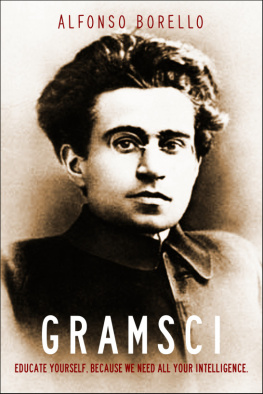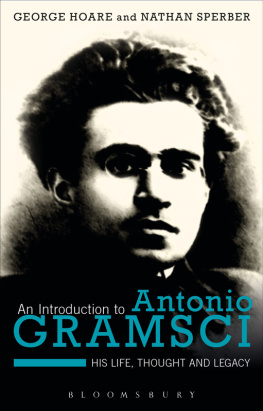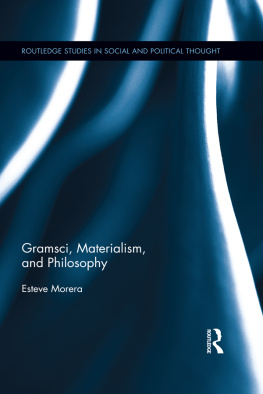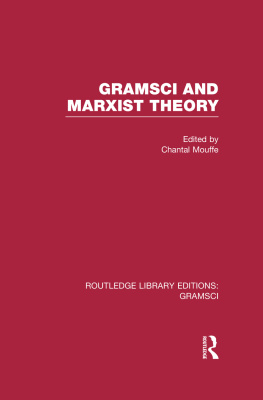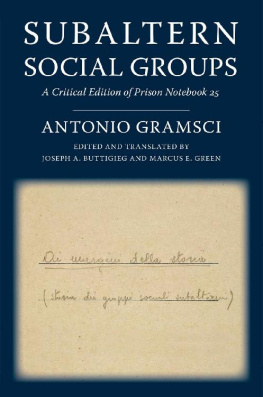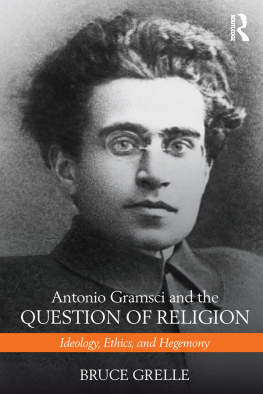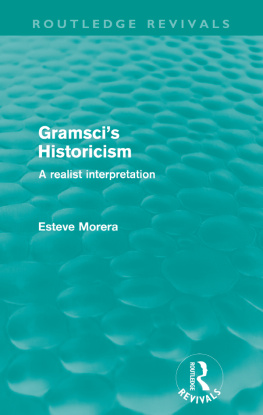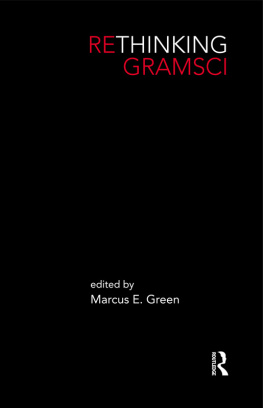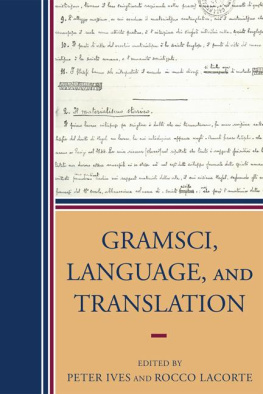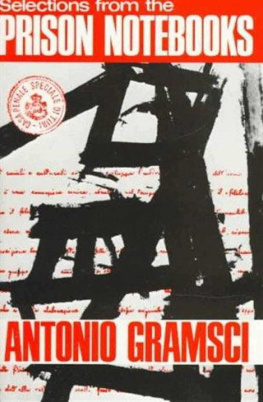Filippini - Using Gramsci: A New Approach (Reading Gramsci)
Here you can read online Filippini - Using Gramsci: A New Approach (Reading Gramsci) full text of the book (entire story) in english for free. Download pdf and epub, get meaning, cover and reviews about this ebook. year: 2016, publisher: Pluto Press, genre: Politics. Description of the work, (preface) as well as reviews are available. Best literature library LitArk.com created for fans of good reading and offers a wide selection of genres:
Romance novel
Science fiction
Adventure
Detective
Science
History
Home and family
Prose
Art
Politics
Computer
Non-fiction
Religion
Business
Children
Humor
Choose a favorite category and find really read worthwhile books. Enjoy immersion in the world of imagination, feel the emotions of the characters or learn something new for yourself, make an fascinating discovery.

Using Gramsci: A New Approach (Reading Gramsci): summary, description and annotation
We offer to read an annotation, description, summary or preface (depends on what the author of the book "Using Gramsci: A New Approach (Reading Gramsci)" wrote himself). If you haven't found the necessary information about the book — write in the comments, we will try to find it.
Filippini: author's other books
Who wrote Using Gramsci: A New Approach (Reading Gramsci)? Find out the surname, the name of the author of the book and a list of all author's works by series.
Using Gramsci: A New Approach (Reading Gramsci) — read online for free the complete book (whole text) full work
Below is the text of the book, divided by pages. System saving the place of the last page read, allows you to conveniently read the book "Using Gramsci: A New Approach (Reading Gramsci)" online for free, without having to search again every time where you left off. Put a bookmark, and you can go to the page where you finished reading at any time.
Font size:
Interval:
Bookmark:
Using Gramsci
Reading Gramsci
General Editors:
Peter Ives, Professor of Politics, University of Winnipeg
and
Adam Morton, Professor of Political Economy, University of Sydney
Also available:
Solidarity without Borders
Gramscian Perspectives on Migration and Civil Society Alliances
Edited by scar Garca Agustn and Martin Bak Jrgensen
Gramsci, Culture and Anthropology
An Introductory Text
Kate Crehan
Gramsci on Tahrir
Revolution and Counter-Revolution in Egypt
Brecht De Smet
Language and Hegemony in Gramsci
Peter Ives
Subalternity, Antagonism, Autonomy:
Constructing the Political Subject
Massimo Modonesi
Translated by Adriana V. Rendn Garrido
and Philip Roberts
Unravelling Gramsci:
Hegemony and Passive Revolution in
the Global Political Economy
Adam David Morton
Using Gramsci
A New Approach
Michele Filippini
Translated by Patrick J. Barr

First published 2017 by Pluto Press
345 Archway Road, London N6 5AA
www.plutobooks.com
Copyright Michele Filippini 2017
English translation copyright Patrick J. Barr 2017
The right of Michele Filippini to be identified as the author of this work has been asserted by him in accordance with the Copyright, Designs and Patents Act 1988.
British Library Cataloguing in Publication Data
A catalogue record for this book is available from the British Library
ISBN 978 0 7453 3569 8 Hardback
ISBN 978 0 7453 3568 1 Paperback
ISBN 978 1 7868 0007 7 PDF eBook
ISBN 978 1 7868 0009 1 Kindle eBook
ISBN 978 1 7868 0008 4 EPUB eBook
This book is printed on paper suitable for recycling and made from fully managed and sustained forest sources. Logging, pulping and manufacturing processes are expected to conform to the environmental standards of the country of origin.
Typeset by Stanford DTP Services, Northampton, England
Simultaneously printed in the European Union and United States of America
To Daniela
Contents
Series Preface
Antonio Gramsci (18911937) is one of the most frequently referenced political theorists and cultural critics of the twentieth century. His pre-disciplinary ideas and especially his articulation of hegemony are commonly referred to in international relations, social and political theory, political economy, historical sociology, critical geography, postcolonial studies, cultural studies, literary criticism, feminism, new social movements, critical anthropology, education studies, media studies and a host of other fields. And yet, his actual writings are steeped in the complex details of history, politics, philosophy and culture that shaped Italys formation as a nation-state as well as in the wider turmoil of twentieth-century world history.
Gramsci began his practical and intellectual odyssey when he moved to Turin University (1911). This move to mainland industrial Italy raised cultural and political contradictions for the young Sardinian, whose identity had been deeply formed by the conditions of uneven development in the South. These issues were pursued by Gramsci whilst he devoted his energy to journalism (between 1914 and 1918) in the newspapers Il Grido del Popolo, Avanti! and La Citt Futura . His activity centred on the Factory Council movement in Turin a radical labour mobilization and editorship of the journal LOrdine Nuovo (191920). Exasperated by the Italian Socialist Partys lack of leadership and effective action during the Biennio Rosso , Gramsci turned his attention to the founding and eventual leadership of the Italian Communist Party (PCdI) as well as the organization of the workers newspaper LUnit until 1926. Gramsci spent from May 1922 to December 1923 in the Soviet Union actively involved in organizational issues within the Communist International (Comintern). This included functioning on the Executive Committee of the Comintern in Moscow as the representative of the PCdI and as a member of various commissions examining organizational, political and procedural problems that linked the various national communist parties. During this period, Gramsci had direct contact with Leon Trotsky and led discussions on the Italian Question, including the united front tactics to tackle Fascism, the trade union relationship, and the limits of party centralism. These issues were developed by Gramsci through the work of ideological hegemony carried out by the PCdI and, following his Moscow period, as a central author and architect of The Lyon Theses a collection of positional statements on the tactics and strategies needed in response to Fascism. The theses are regarded as a major survey of the conditions of uneven development confronting social forces within Italy and the European states-system at the time.
By 1926, after drafting his famous essay Some Aspects of the Southern Question, Gramsci was arrested as a Communist Party deputy by the Fascist authorities and was incarcerated until a few days before his death in 1937. Gramsci wrote almost 500 letters in prison; over half were to his sister-in-law, Tatiana Schucht, who was living in Rome and became his key supporter and his most frequent visitor. She also conveyed Gramscis ideas to another significant patron, Piero Sraffa, the Italian economist then at Cambridge. These letters constitute a rich mixture of intellectual, cultural and political analysis as well as representing the daily struggle of prison life including Gramscis increasingly severe health problems. But the most enduring and influential component of his legacy is the 33 notebooks penned between 1929 and 1936 that together constitute the Quaderni del carcere (Prison Notebooks ). Tatiana Schucht hid these notebooks in a vault at the Banca Commerciale Italiana while she arranged for their transportation to Moscow. Publication of the Prison Notebooks in Italian ensued from the late 1940s onwards and has continued in various languages ever since.
The breadth of the above political and intellectual journey is perhaps matched by the depth of detail and coverage contained within Gramscis pre-prison and prison writings. The study of intellectuals in Italy, their origins and grouping according to cultural currents; his engagement with, and critique of, Italys most important intellectual of the time, Benedetto Croce; the study of comparative linguistics and the Italian language question; analysis of the Sicilian writer Luigi Pirandello and the potential his plays offered for transforming Italian culture and society; and discussion of the role of the serialized novel and popular taste in literature would be later expanded into a wider plan. This chiefly focused on Italian history in the nineteenth century, with special attention being directed to Italys faltering entrance into capitalist modernity under conditions of passive revolution, including the imposition of a standard Italian language; the theory of history and historiography; and the expansion of the capitalist labour process through assembly plant production techniques beyond the United States under the rubric of Americanism and Fordism. In summary, issues of hegemony, consciousness and the revolutionary process are at the centre of Gramscis attention. It is for such reasons that Antonio Gramsci can be regarded as one of the most significant Marxists of the twentieth century, who merits inclusion in any register of classical social theorists.
Reading Gramsci, however, is no easy task. He plunges into the complexities of debates of his time that are now obscure to many readers and engages in an enormous range of topics that at first seem unrelated. Moreover, the prison conditions and his own method yield a set of open-ended, fragmented and intricately layered
Next pageFont size:
Interval:
Bookmark:
Similar books «Using Gramsci: A New Approach (Reading Gramsci)»
Look at similar books to Using Gramsci: A New Approach (Reading Gramsci). We have selected literature similar in name and meaning in the hope of providing readers with more options to find new, interesting, not yet read works.
Discussion, reviews of the book Using Gramsci: A New Approach (Reading Gramsci) and just readers' own opinions. Leave your comments, write what you think about the work, its meaning or the main characters. Specify what exactly you liked and what you didn't like, and why you think so.

